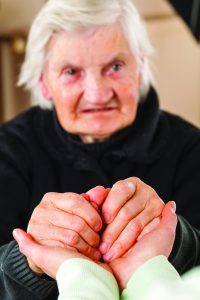A couple of years ago, Allegheny County resident Patrick S. had a brief hospital stay then was discharged from a local hospital after struggling with early onset dementia. Patrick was aware of his health situation and, for the most part, knew how to handle his condition, but once he was back in his own home, everyday activities sometimes tripped him up. For example, Patrick occasionally confused his medications and took multiple doses of them. Because his wife works during the day, Patrick would also forget to eat his meals when she was not there.
Then Patrick received a home visit from a Care Transitions coach with the Allegheny County Department of Human Services Area Agency of Aging’s (DHS/AAA) Community-based Care Transitions Program (CCTP). “I liked the idea of having a coach come to my home and getting the additional support that I sometimes need,” Patrick says.
The coach explained to Patrick about a medication management program known as My Medi-Pak and introduced to him a new way of managing and storing pertinent medical information within his personal health record for easy reference. Furthermore, the coach suggested a home-delivered meals program for Patrick’s meals during the week.
Patrick is a United States veteran but the coach discovered that he had not been utilizing his veterans benefits because he was unaware of the services that veterans are entitled to. The coach referred him to the VA to see what services Patrick is eligible for. He and his wife also utilized many of the referrals given to them and have gotten the appropriate services and supports that they will need going forward, including respite options and an adult day program.
What is CCTP?

The Community-based Care Transitions Program (CCTP) started as a grant-funded program launched in Allegheny County in late 2012 designed to work with adults who are considered to be high risk for 30-day hospital readmissions. Over the past few years, the program has expanded to serve other payers.
The program’s goal is to reduce readmissions rates across each hospital, improve transitional care services among the community and healthcare providers, ensure the community understands how to effectively navigate the health system, and educate the community about the various community and social supports and services that are available to them.
Care Transitions Intervention

A cornerstone of the program is a personalized approached called Care Transitions Intervention, in which a certified “coach” (employed by DHS/AAADH) is provided to every Medicaid fee-for-service patient who is discharged from a partnering hospital. These “care transition” coaches motivate and empower participants to more actively and effectively self-manage.
The coaches work personally with seniors and the adult population to help them gain the knowledge, skills, tools and confidence they need to become active participants in coordinating their care and managing their conditions, according to their self-defined health goals. The coaching is centered around what is called the “four pillars of personal health”:
Medication self-management: This ensures that the patient is knowledgeable about the medications they must take and has an understandable system for taking these meds.
Personal health record: This helps the patient keep track of their personal medical records, which can be used by all of the patients’ healthcare providers.
Follow-up with PCP/specialist: The coach makes sure that the patient schedules and prepares for any follow-up visits they must have with their primary care physician or medical specialists.
Knowledge of red flags: And finally, the coach informs the patient of what to look for as far as dangerous warning signs related to his or her diagnosis, such as weight gain for a patient who suffered congestive heart failure.
The coaching intervention consists of an in-hospital visit at least 24 hours prior to discharge, a home visit within 72 hours of discharge, and three follow-up phone calls within 30 days of discharge.
For more information about CCPT, call the DHS/AAA SeniorLine at (412) 350-5460.
Powerful Tools for Caregivers Series starts next month

The Allegheny County Department of Human Services Area Agency on Aging (DHS/AAA) is offering a six-week class called “Powerful Tools for Caregivers” beginning in October. The class will cover topics such as taking care of yourself, identifying and reducing personal stress, learning to communicate your feelings and needs, managing challenging situations and your emotions, and mastering caregiving decisions.
The dates of the sessions are:
• October 3 from 10 a.m. to noon: Session 1: Taking Care of You
• October 10 from 10 a.m. to noon: Session 2: Identifying and Reducing Personal Stress
• October 17 from 10 a.m. to noon: Session 3: Communicating Feelings, Needs, and Concerns
• October 24 from 10 a.m. to noon: Session 4: Communicating in Challenging Situations
• October 31 from 10 a.m. to noon: Session 5: Learning from Our Emotions
• November 7 from 10 a.m. to noon: Session 6: Mastering Caregiving Decisions
The Agency is also offering a once-monthly class this fall called “Mental Health First Aid for Older Adults.” This class will include the following topics: mental health disorder prevalence and signs, action plans for intervening in a crisis, warning signs for suicide, de-escalating aggressive behavior, dementia and
communication strategies.
The dates of the classes are:
• September 19 from 8:30 a.m. to 4:30 p.m.
• October 20 from 8:30 a.m. to 4:30 p.m.
• November 16 from 8:30 a.m. to 4:30 p.m.
• December 15 from 8:30 a.m. to 4:30 p.m.
Classes will take place at the DHS/AAA offices located at 2100 Wharton Street in the South Side. There is no cost for caregivers but registration is required. RSVP by calling (412) 350-4996 or emailing Brenda.Slagle@alleghenycounty.us.
By Gina Mazza
For Pittsburgh Senior News

